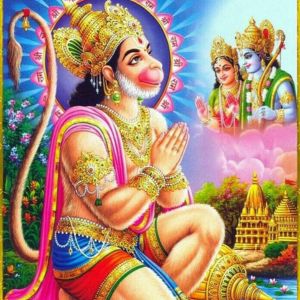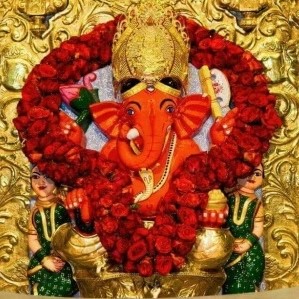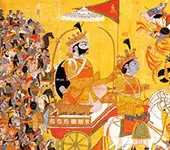Bhishma Pitamah: The Most Enduring Character from Mahabharata
Quiz
Who killed seven of her children by drowning them in the river ?Transcript
(Click here to read more)
Bhishma is often referred to as pitamaha because he was the grandfather in stature for both the Pandavas and the Kauravas. Their biological grandfather, Vyasa was Bhishma’s step-brother. Bhishma was the eldest surviving son of King Shantanu. Ganga was his mother. There are eight Vedic Gods called the Ashta Vasus. They were cursed by Vasishta to take birth on earth. They took birth as the sons of Ganga. Bhishma was the last among them. His original name was Devavrata. Brihaspati, Shukracharya, Vasishta, Chyavana, Sanatkumara, Mark....
Transcript
(Click here)
Bhishma is often referred to as pitamaha because he was the grandfather in stature for both the Pandavas and the Kauravas.
Their biological grandfather, Vyasa was Bhishma’s step-brother.
Bhishma was the eldest surviving son of King Shantanu.
Ganga was his mother.
There are eight Vedic Gods called the Ashta Vasus.
They were cursed by Vasishta to take birth on earth.
They took birth as the sons of Ganga.
Bhishma was the last among them.
His original name was Devavrata.
Brihaspati, Shukracharya, Vasishta, Chyavana, Sanatkumara, Markandeya, Parashurama, and Indra were his gurus.
After his learning was completed, ganga left him with his father and went away.
The name Bhishma means someone who instills fear.
He was to become the king of the Kuru kingdom but shantanu wanted to marry Satyavati.
Her father insisted that her son should only become the king.
Bhishma took a vow of celibacy to make his father happy.
Bhishma got a blessing from his father that he would die only when he wishes.
After Shantanu died, Bhishma played a major role in the affairs of the Kuru Kingdom bhishma is also famous for the abduction of the three princesses of Kashi: Amba, Ambika, and Ambalika.
This was for his half-brothers, Chitrangada and Vichitravirya.
In those days, marriage by abduction was permitted for Kshatriyas.
Till the tenth day of the Kurukshetra war, Bhishma was the supreme commander of the Kaurava army at the beginning of the war, Bhishma had promised that he would not kill any of the Pandavas.
Later, Bhishma himself had given advice on how to disarm him in the fight.
He would put down his arms if confronted by someone who has been a woman once.
Shikhandi, the rebirth of Amba was a transgender.
On the tenth day of the war, Arjuna attacked Bhishma with Shikhandi in the front.
Bhishma put down his arms.
Arjuna injured Bhishma with numerous arrows.
Bhishma waited for 51 days on a bed of arrows for the auspicious uttarayana to begin before he left his body.
His death anniversary is celebrated as Bhishma Ashtami in the Shukla paksha of Magha masa, yudhishtira received the famous Vishnu Sahasranama from Bhishma while he was in the bed of arrows.
Bhishma is celebrated as one of the highest authorities in Dharma Shastra.
Recommended for you
Chitra Nakshatra Features

Everything you wanted to know about Chitra Nakshatra - Characteristics, career, health issues, marriage life.... ....
Click here to know more..Hanuman Ji's Blessing: Achieve Success Everywhere!

om bhoorbhuvassuvah' shreehanumate namah'....
Click here to know more..Siddhi Vinayaka Stotram

विघ्नेश विघ्नचयखण्डननामधेय श्रीशङ्करात्मज सुराधिपवन्....
Click here to know more..
English Topics
Mahabharatam
Click on any topic to open
- 95 What is behind Calling the Five Brothers the Pandavas
- 94 Give up an Individual IF....
- 93 Fascinating Birth Story of the Kauravas
- 92 Overcoming Grief - Lessons from King Senajit's story
- 91 Yayati's Wisdom
- 90 Yayati's Story
- 89 Brahmacharis Can Bless And Curse
- 88 Human Nature - Comples Mix Of Good And Bad
- 87 Results Of Good Karma
- 86 What Gives Results - Luck or Effort?
Please wait while the audio list loads..
30
Ganapathy
Shiva
Hanuman
Devi
Vishnu Sahasranama
Mahabharatam
Practical Wisdom
Yoga Vasishta
Vedas
Rituals
Rare Topics
Devi Mahatmyam
Glory of Venkatesha
Shani Mahatmya
Story of Sri Yantra
Rudram Explained
Atharva Sheersha
Sri Suktam
Kathopanishad
Ramayana
Mystique
Mantra Shastra
Bharat Matha
Bhagavatam
Astrology
Temples
Spiritual books
Purana Stories
Festivals
Sages and Saints
